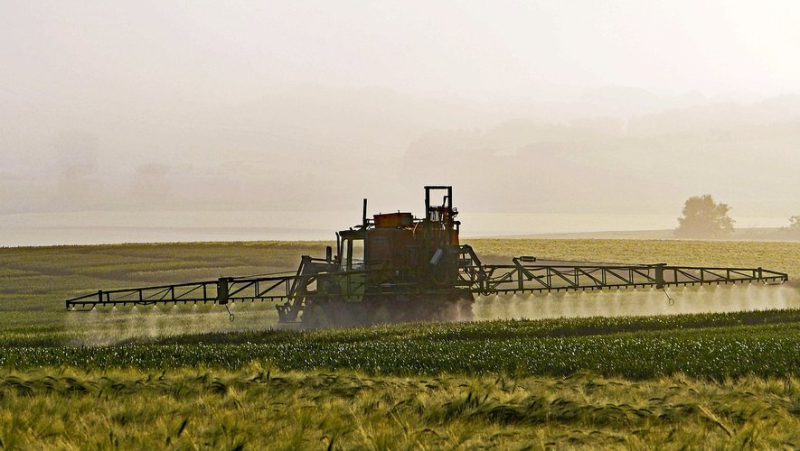“The regulations do not protect you”: the appeal of 800 caregivers facing the “denial of scientific knowledge” on pesticides

De nombreuses études font le lien entre pesticides et atteinte à la santé. PIXABAY – HPGRUESEN
On the occasion of Alternatives to Pesticides Week, the association "Alert of doctors on pesticides" launches an appeal already signed by nearly 800 caregivers for immediate measures to be applied to protect the population from the effects of endocrine disruptors on health, on the basis of recognized scientific data.
"One health, do these words still have meaning ?"Dr. Pierre-Michel Perinaud, president of the association "Alert of doctors on pesticides", launched this Thursday, March 28, the appeal of nearly 800 caregivers to protect the population against pesticides, while reports accumulate on the consequences of their toxicity on health but "government decisions in the face of the agricultural crisis" mark "a halt to the reduction in the use of pesticides", in a "denial of scientific knowledge".
The collective deplores the "pausing of the Ecophyto plan" and the "satisfaction of the desires of the most productive agriculture", while recalling "the attempt to muzzle Anses", after the newspaper Le Monde reported, on Wednesday, the late publication of a report on glyphosate, which had remained in the boxes of the health security agency for eight years.
Cancers, neurodegenerative diseases, neurodevelopmental disorders, respiratory pathologies, impact on fertility… for caregivers, current studies have already established "presumptive links" between exposure to PEE (disruptive environmental endocrine) and diseases.
"These are not causal links, causal links are not possible to achieve in environmental health", specifies Dr. Perinaud.
Documented environmental violations
"The caregivers who signed this text consider that the government's decisions are irresponsible in view of the scientific data provided by INRAE and the INRAE. Inserm", exclaims the collective, which also mentions environmental damage, knowing that "the agricultural crisis is partly in the South-West by chance" : cattle breeders were facing an epidemic of epizootic hemorrhagic disease "in a context of drought", a situation which "illustrates the growing vulnerability of agriculture to climate risks".
The collective cites in particular the report from Inrae "European agriculture without chemical pesticides in 2050 ?" and ;rsquo;Inrae Ifremer collective scientific expertise from May 2022 on the "Impacts of plant protection products on biodiversity and ecosystem services" :"These reports confirm that all environments are contaminated, the bird population has fallen by 25% in 40 years, by 60% in agricultural environments alone, and pesticides are to blame", accuses Rémy Mazurier, member of the association, doctor in Strasbourg.
"100 % of the population is impregnated"
In matters of health, the collective still refers to several studies, in particular the collective expertise Pesticides and health of Inserm in 2021, and the study Geocap Agri in a wine-growing environment.
"In 2021, 19 occupational pathologies are linked to exposure to pesticides", underlines Rémy Mazurier, who reports increased risks of cancers, and in particular blood cancers (myeloma), but also neurodegenerative diseases, hypothyroidism, respiratory diseases…
On the problem of exposure to fetuses during pregnancy: leukemia, brain tumors, congenital malformations, neurodevelopmental disorders…hellip; "All these problems that are exploding in our practices are linked to exposure during pregnancy.
In the general population: prostate cancers, cognitive disorders, asthma…
"The mechanisms leading to the increased prevalence of asthma due to pyrethroids have been demonstrated in the ;Esteban study from Inserm", details the Strasbourg doctor.
According to him, "100 % of the population is today impregnated with pesticides", as their presence in the environment and food, where "two-thirds of food is contaminated", is massive.
Because "political choices are unacceptable" faced with the situation, caregivers make five recommendations.< /p>
Green ordinances, priority to local organic products… the five recommendations of caregivers
First proposal: prescreire des "green ordinances" for pregnant women during pregnancy, based on the model of an experience initiated last week in the Charentes department, as well as an older experience in Strasbourg: "It consists of combining information on endocrine disruptors and the provision of a basket of organic vegetables to the pregnant woman".
Second proposition : "Use local organic food as a tool for public health", in collective catering and in particular school canteens.
Third proposition : apply "full and entire" European regulations on pesticides.
Fourth proposal : protect residents of areas of intensive agriculture and go beyond the current protection of the population, respecting a distance of 5 meters from a home for the spreading of phytosanitary products, 10 meters for tall crops. "We ask for protection of schools from 150 m to 200 m".
Fifth proposal : fight against the under-declaration of occupational diseases linked to pesticides.
"We must go further in action whereas we are currently doing the opposite, we are in a form of astonishment total", deplores Dr. Perinaud.




